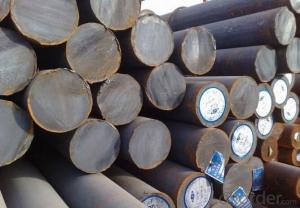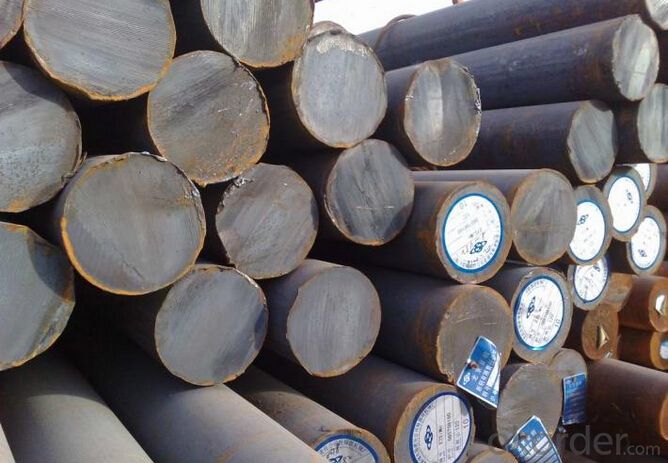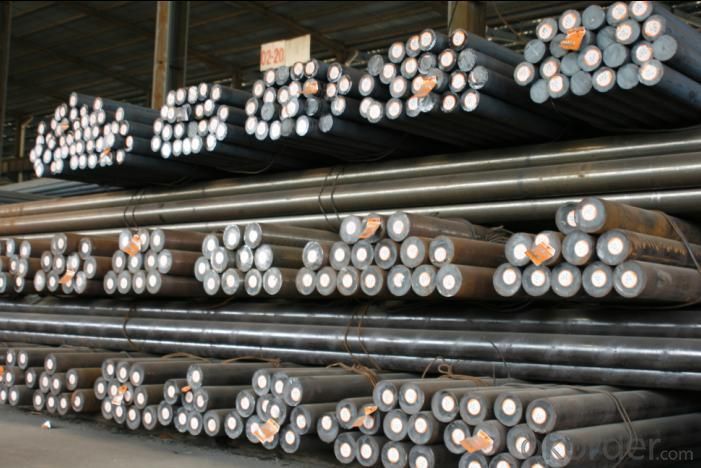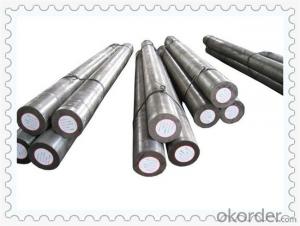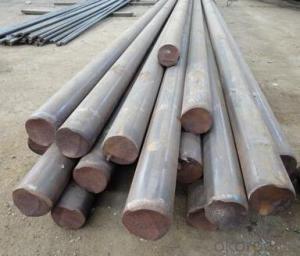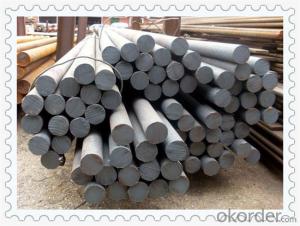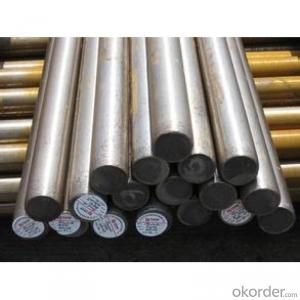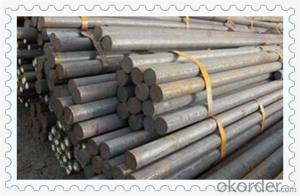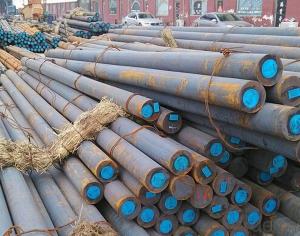Round Bars Carbon Steel 1020 1045 1040
- Loading Port:
- China main port
- Payment Terms:
- TT OR LC
- Min Order Qty:
- 30 m.t.
- Supply Capability:
- 10000 m.t./month
OKorder Service Pledge
OKorder Financial Service
You Might Also Like
Specification
Round Bars Carbon Steel 1020 1045 1040
Product Information:
Material:High Quality Carbon Structural Steel 1020
Size:Diameter:10-700mm
Length:6000mm-12000mm
Origin place :Made In China
Delivery Condition:Hot rolled, cold drawn, forged
Surface require:Black, grinding, bright, polish
Heat treatment:Quenched, Tempered, annealed
Packing:Seaworthy packing ,wooden case ,carton,woven bag or at client's requires
Delivery time:According to order’s quantity.
Trade Term:EXW,FOB,CIF
Payments:T/T or L/C at sight
Port:China main Port, such as shanghai, Dalian, Shenzhen port.
MOQ:30 Metric Ton
| Material | AISI 1020, S20C, C22,1.0402 | Round bar | Dia(mm) | Max 700 |
| Process | EAF + LF + VD + Forged + Heat Treatment (optional) | Length (mm) | Max 12000 | |
| Heat treatment | Normalized / Annealed / Quenched / tempered | Plate bar | Thickness(mm) | Max 200 |
| Delivery condition | Hot forged +Rough machined (black surface after Q/T)+ Turned (optional) | Width(mm) | Max 3000 | |
| Test | Ultrasonic test according to SEP 1921-84 D/d | Length (mm) | Max 12000 |
Product Overviews:
| Product Name | Typical Grades | Diameter(mm) | Standard adopted |
| Carbon Steel | 20 (1020/S20C/C22) | Ø16-Ø300 | GB/SAE/JIS/DIN |
| 40 (1040/S40C/C40) | |||
| 45 (1045/S45C/C45) | |||
| Bearing Steel | GCr9 (51100/SUJ1) | Ø12-Ø250 | |
| GCr15 (52100/SUJ2/100Gr6) | |||
| GCr9SiMn (A485-Gr.1/SUJ3) | |||
| Cr-Mo Steel | 20Cr (5120/SCr420H/20Cr4) | Ø12-Ø250 | |
| 40Cr (5140/SCr440/41Cr4) | |||
| 42CrMo(4140/SCM440/42CrMo4) | |||
| Gear Steel | 20CrNiMo | Ø16-Ø600 | |
| 20CrMn(5115/SMnC420/20MnCr5) | |||
| 20CrNiMo(8620/SNCM220/20CrMiMo2) |
Product Show:

Our Advantages:
· Industry experience over 20 years.
· Shipment of goods -More than 70 countries worldwide.
· The most convenient transport and prompt delivery.
· Competitive price with best service.
· High technical production line with top quality products.
· High reputation based on best quality products.
With our experienced, enthusiastic and dynamic staffs, we assure to bring you the products with best quality, reasonable prices and good after-sales services under the motto: Friends First, Business After.
Communication, Experience, Expertise and Best efforts are our Promises to you.
- Q: How does special steel contribute to the medical aftermarket industry?
- Special steel plays a crucial role in the medical aftermarket industry by providing high-quality materials necessary for manufacturing medical devices and equipment. Special steel, also known as stainless steel, offers numerous advantages that make it ideal for medical applications. First and foremost, special steel is highly resistant to corrosion and rust, which is essential in the medical field where hygiene and cleanliness are of utmost importance. Medical devices like surgical instruments, implants, and equipment need to be sterilized frequently, and the corrosion resistance of special steel ensures their durability and longevity. Additionally, special steel possesses excellent strength and hardness properties, making it suitable for medical implants and prosthetics. These implants must be strong enough to endure the stresses and strains of the human body while maintaining their structural integrity. Special steel provides the necessary strength and toughness required for these critical applications. Furthermore, special steel is biocompatible, meaning it does not cause any adverse reactions or toxicity when in contact with living tissues. This property is essential for implants and devices that come into direct contact with the human body, as it minimizes the risk of rejection or allergic reactions. Moreover, special steel's versatility allows it to be easily machined and fabricated into complex shapes and sizes, meeting the diverse requirements of medical applications. It can be formed into delicate surgical instruments, precision cutting tools, and even large-scale equipment such as hospital beds and imaging machines. The high precision and dimensional stability of special steel contribute to the accuracy and reliability of medical devices. This is especially crucial in areas like diagnostics and imaging, where precise measurements and high-quality images are vital for accurate diagnosis and treatment planning. In conclusion, special steel's corrosion resistance, strength, biocompatibility, and versatility make it an invaluable material in the medical aftermarket industry. Its use in manufacturing medical devices and equipment ensures the highest standards of hygiene, durability, and performance, ultimately contributing to the advancement of healthcare and improving patient outcomes.
- Q: What are the main elements in special steel alloys?
- The composition of special steel alloys varies depending on the specific type of alloy and its intended use. However, there are several shared elements that are often found in these alloys. These elements include: 1. Iron (Fe): Iron is the primary component of steel alloys, providing the foundation for their strength and durability. 2. Carbon (C): Carbon plays a crucial role in steel alloys, greatly impacting their hardness and strength. Different carbon levels can result in varying properties, such as high carbon steel for increased hardness or low carbon steel for improved flexibility. 3. Chromium (Cr): Steel alloys are frequently enriched with chromium to enhance their resistance to corrosion. It forms a protective layer on the alloy's surface, preventing oxidation and rusting. 4. Nickel (Ni): Nickel is commonly incorporated into special steel alloys to enhance their heat and corrosion resistance. It also contributes to improving the material's strength and toughness. 5. Manganese (Mn): Manganese is often added to steel alloys to improve their workability and machinability. It also enhances their strength and impact resistance. 6. Molybdenum (Mo): Special steel alloys often contain molybdenum to increase their strength, hardness, and ability to withstand high temperatures. It also improves their resistance to corrosion. 7. Vanadium (V): Vanadium is frequently used in steel alloys to enhance their strength, toughness, and heat resistance. It also aids in refining the alloy's grain structure, resulting in improved performance. These are just a few examples of the common elements found in special steel alloys. Depending on specific requirements and desired properties, other elements like tungsten, cobalt, copper, and titanium may also be present in varying proportions. The combination of these elements allows for the creation of specialized steel alloys with unique properties tailored for specific applications in industries such as aerospace, automotive, construction, and manufacturing.
- Q: How does stainless steel contribute to the construction industry?
- Stainless steel contributes to the construction industry by providing durability, corrosion resistance, and aesthetic appeal. It is widely used in structural applications, such as building facades, bridges, and roofing, as it can withstand harsh weather conditions and maintain its strength over time. Stainless steel's resistance to corrosion also makes it a suitable choice for plumbing, electrical, and HVAC systems, ensuring longevity and minimizing maintenance. Additionally, its sleek and modern appearance enhances the overall aesthetics of architectural designs.
- Q: What are the different alloying elements used in special steel?
- There are various alloying elements used in special steel, including chromium, nickel, molybdenum, vanadium, tungsten, manganese, and silicon, among others. These elements are added in specific quantities to enhance the steel's properties such as corrosion resistance, hardness, toughness, and heat resistance, making it suitable for specific applications in industries like aerospace, automotive, and construction.
- Q: How does the composition of special steel affect its mechanical properties?
- The composition of special steel significantly affects its mechanical properties. Various alloying elements such as carbon, manganese, chromium, nickel, and others are added in specific quantities to enhance the steel's strength, hardness, toughness, and corrosion resistance. The presence and ratio of these elements determine the steel's microstructure, which in turn determines its mechanical properties. For example, higher carbon content increases hardness and strength, while manganese improves toughness. Similarly, chromium and nickel increase corrosion resistance and provide better heat resistance. Therefore, the composition of special steel plays a crucial role in defining its mechanical properties.
- Q: How is special steel used in the production of conveyor belts?
- Special steel is used in the production of conveyor belts to enhance their durability, strength, and overall performance. Conveyor belts are commonly used in industries such as mining, manufacturing, food processing, and logistics to transport materials and goods. These belts are subjected to various demanding conditions, including heavy loads, high temperatures, and abrasive materials. Special steel alloys, such as stainless steel or heat-resistant steel, are used in specific parts of the conveyor belt to ensure its longevity and reliability. For example, stainless steel is often used in the wire mesh belts to prevent corrosion and rust, especially when the conveyor belt is exposed to moisture or chemicals. This helps to maintain the smooth and efficient movement of materials without contamination. Furthermore, special steel is employed in the manufacturing of belt fasteners, hinges, and other connecting components. These parts need to withstand significant tension, heat, and wear, and standard steel may not provide the necessary strength and durability. Special steel alloys can offer superior strength, resistance to high temperatures, and improved wear resistance, ensuring that the conveyor belt can function reliably even under demanding conditions. Moreover, in some applications where the conveyor belt is exposed to extreme temperatures, such as in steel mills or foundries, special heat-resistant steel is used. This steel can withstand the intense heat without deforming or losing its strength. It allows the conveyor belt to continue operating safely and efficiently in such extreme environments. In summary, special steel is essential in the production of conveyor belts as it enhances their durability, strength, and ability to withstand demanding conditions. Its use in wire mesh belts, fasteners, hinges, and heat-resistant components ensures the longevity and reliability of conveyor belts in various industries.
- Q: What are the different surface hardening techniques for special steel parts?
- Special steel parts can undergo various surface hardening techniques, each with its own advantages and characteristics. Some commonly used techniques include: 1. Carburizing: This technique involves heating the steel part in a carbon-rich atmosphere to introduce carbon into its surface. The result is a hardened outer layer with high carbon content, while the core remains tough and ductile. Carburizing improves wear resistance and overall strength. 2. Nitriding: Nitriding diffuses nitrogen into the steel part's surface, forming nitrides. This creates a hard and wear-resistant surface layer with improved fatigue strength. Nitriding can be done at lower temperatures, reducing the risk of distortion or dimensional changes. 3. Induction Hardening: By using high-frequency induction heating, this technique selectively heats the steel part's surface. Rapid quenching follows, resulting in a hardened outer layer. With induction hardening, precise control over hardened depth is possible, and it can be applied to specific areas to enhance wear resistance and strength. 4. Flame Hardening: Here, the steel part's surface is heated using an oxy-acetylene or oxy-propane flame. Quick quenching follows, leading to a hardened surface layer. Flame hardening is commonly used for large or irregularly shaped parts, offering excellent wear resistance. 5. Laser Hardening: This technique utilizes a high-intensity laser beam to heat and rapidly cool the steel part's surface. It allows precise control over the hardened area and depth, minimizing distortion and maintaining tight tolerances. Laser hardening is particularly effective for small, complex parts or localized hardening requirements. By choosing the appropriate method, manufacturers can enhance the durability, strength, and performance of special steel parts in diverse applications.
- Q: What is the significance of tensile strength in special steel?
- Tensile strength is of great significance in special steel because it determines the steel's ability to withstand stretching or pulling forces without breaking or deforming. This property is crucial in various industries, especially in manufacturing and construction, where high tensile strength is required for structural integrity and safety. Special steel with superior tensile strength can withstand heavy loads, resist impacts, and provide durability, making it highly sought after in applications such as building infrastructure, automotive manufacturing, and aerospace engineering.
- Q: What are the main advantages of using special steel in aerospace applications?
- The main advantages of using special steel in aerospace applications are its superior strength, toughness, and corrosion resistance. Special steel can withstand extreme temperatures and pressures, making it suitable for critical components such as engine parts and landing gear. Its high strength-to-weight ratio allows for lighter aircraft designs, improving fuel efficiency and performance. Additionally, special steel's excellent fatigue resistance ensures the long-term reliability and safety of aerospace structures.
- Q: Can special steel be used for structural applications?
- Yes, special steel can be used for structural applications. Special steel refers to a wide range of steel alloys that are specifically designed to possess enhanced mechanical properties, such as increased strength, durability, and corrosion resistance. These qualities make special steel suitable for various structural applications, including buildings, bridges, pipelines, and heavy machinery.
Send your message to us
Round Bars Carbon Steel 1020 1045 1040
- Loading Port:
- China main port
- Payment Terms:
- TT OR LC
- Min Order Qty:
- 30 m.t.
- Supply Capability:
- 10000 m.t./month
OKorder Service Pledge
OKorder Financial Service
Similar products
Hot products
Hot Searches
Related keywords
